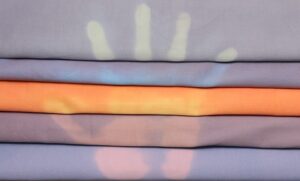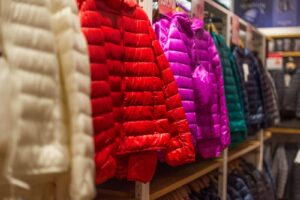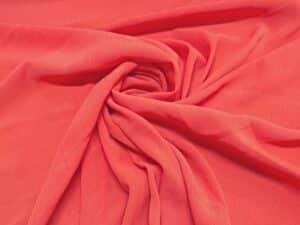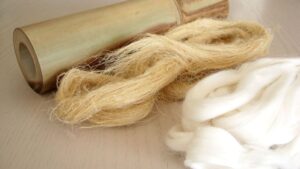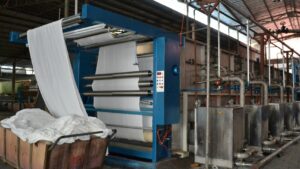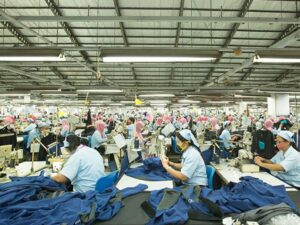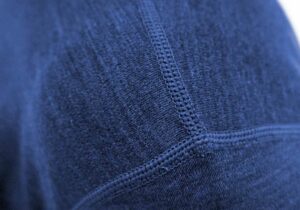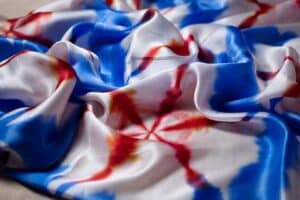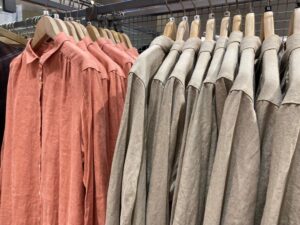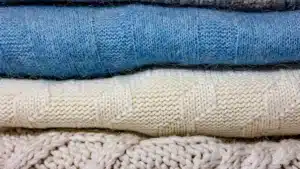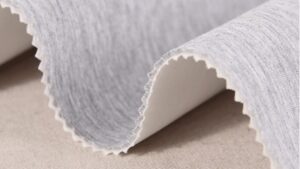
When picking the right jersey fabric, knowing the differences helps. Cotton jersey feels soft and natural on the skin. Synthetic jersey is stretchy and lasts longer. Both types have special features for different uses. Understanding these helps you choose for comfort, performance, or the environment.

Key Takeaways
Cotton jersey is soft, airy, and good for casual clothes. It feels nice on the skin and works well for daily wear.
Synthetic jersey is strong and keeps sweat away, great for sports. It helps you stay dry and comfy while exercising.
Think about eco-friendly choices like organic or recycled cotton. These are kinder to the planet and still feel good to wear.
Cotton jersey might shrink and wear out quicker. Synthetic jersey lasts longer but may bother sensitive skin because of chemicals.
Pick your fabric based on how you live. For comfort, choose cotton. For activity, pick synthetic. Match it to what you need.
Cotton Jersey Fabric
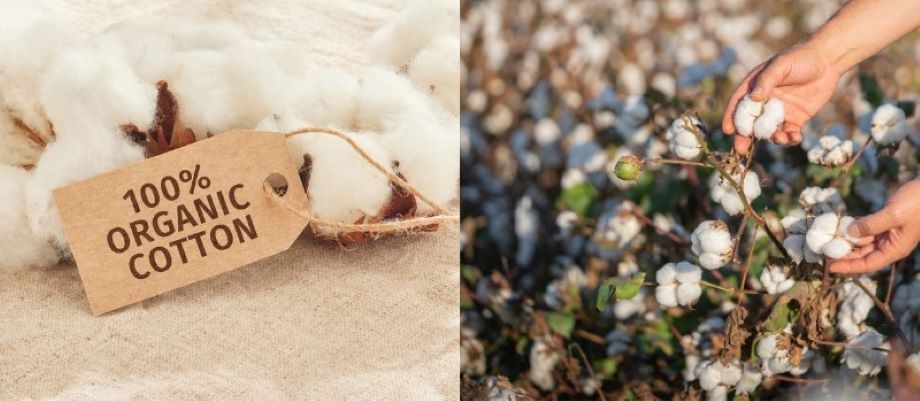
Properties of Cotton Jersey Fabric
Cotton jersey is a soft and light fabric made from natural cotton. It stretches because of how it’s knitted, not from added synthetic fibers. This fabric feels smooth and lets air pass through, making it great for hot days. Sometimes, cotton jersey is mixed with synthetic fibers like polyester. These blends make it stronger, less likely to wrinkle, and keep colors bright. They combine cotton’s comfort with the benefits of synthetic materials.
Newer types of jersey fabric include organic and recycled cotton. These are better for the environment and still soft and useful. Adding elastane to cotton jersey makes it stretchier and helps clothes fit better, like t-shirts and dresses.
Benefits of Cotton Jersey Fabric
Cotton jersey fabric has many good qualities that make it popular:
Softness and Comfort: It feels gentle and is great for sensitive skin.
Breathability: Air flows through it, keeping you cool in warm weather.
Moisture Absorption: It soaks up sweat, helping you stay dry.
Versatility: It’s perfect for casual clothes like t-shirts or even dressier outfits.
Eco-Friendly Options: Organic and recycled cotton fabrics are better for the planet.
More people, especially younger ones, love cotton jersey for casual and sportswear. Its comfort and usefulness make it a favorite in fashion.
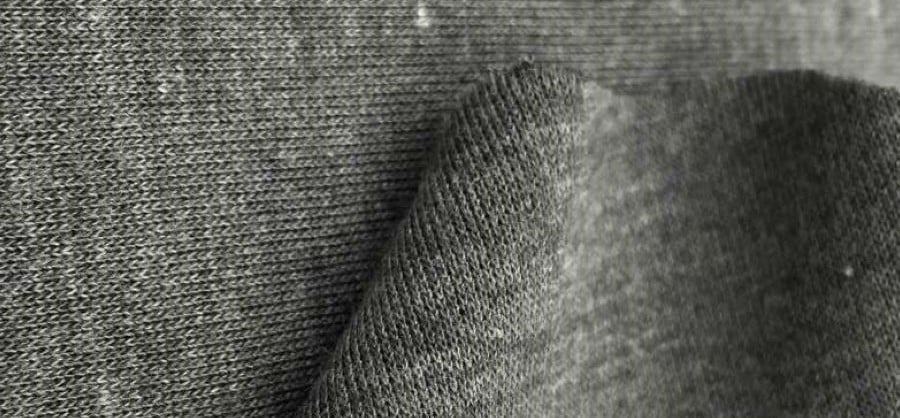
Drawbacks of Cotton Jersey Fabric
Even though cotton jersey has many advantages, it also has some downsides:
Durability Issues: Pure cotton can wear out faster than blends, especially with frequent washing.
Shrinkage: It might shrink if not washed and dried correctly.
Air Permeability: Recycled cotton may block air more, making it less breathable.
Thermal Resistance: Recycled fibers can make the fabric thicker and feel warmer.
These issues show why taking care of cotton jersey is important. Blended fabrics can also help improve its performance.
Synthetic Jersey Fabric
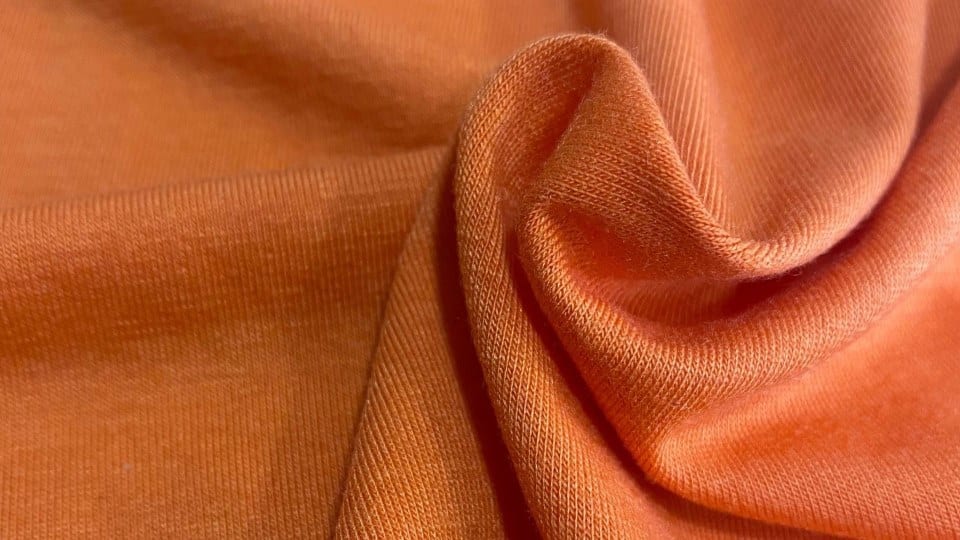
Properties of Synthetic Jersey Fabric
Synthetic jersey is made from man-made fibers like polyester and nylon. These fibers are designed to give the fabric special qualities. For example:
It is strong and lasts a long time without tearing.
It stretches easily, making it great for activewear.
The fabric doesn’t wrinkle, staying smooth even after use.
Polyester jersey is a common type of synthetic fabric. It feels smooth, stretches well, and allows air to pass through. This makes it perfect for sports and workout clothes.
Benefits of Synthetic Jersey Fabric
Synthetic fabrics have many useful features:
Durability: They last longer than natural fabrics, even with heavy use.
Moisture-Wicking: They push sweat away, keeping you dry during exercise.
Lightweight: The fabric is light, so it’s comfy for outdoor activities.
Stretch and Recovery: It stretches but keeps its shape after use.
Low Maintenance: It resists wrinkles and stains, making it easy to clean.
If you need clothes for sports or workouts, synthetic jersey is a great choice. It handles sweat and movement well, making it ideal for active lifestyles.
Drawbacks of Synthetic Jersey Fabric
Synthetic fabrics also have some problems. The chemicals used to make them can be harmful. For example:
Chemicals like Antimony and Formaldehyde may irritate skin or breathing.
Phthalates, found in some synthetics, can affect normal growth.
Studies show these chemicals may harm lungs and pollute the environment. While the fibers are safe, the chemicals need attention. If you have sensitive skin or care about health, look for other options.
Comparing Cotton Jersey and Synthetic Jersey Fabrics
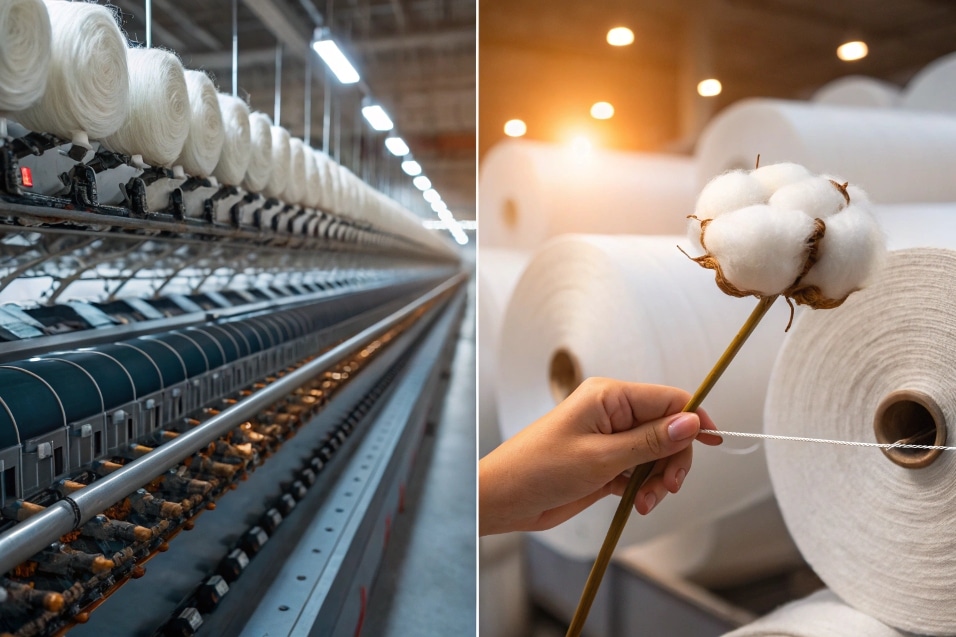
Comfort and Softness
Cotton fabric feels soft and gentle on the skin. It’s great for everyday clothes because it’s natural and smooth. Cotton jersey is especially comfy and works well for sensitive skin. Synthetic jersey stretches but isn’t as soft as cotton. This difference matters if you want extra comfort.
Studies show cotton is better for comfort than synthetic blends. The table below shows key comparisons:
Property | Cotton Fabric | Synthetic Fabric (Blended) |
|---|---|---|
Better | Inferior | |
Thermal Comfort | Investigated | Proposed Design Concept |
Choose cotton jersey if softness and breathability are important. Synthetic jersey works better if performance matters more than comfort.
Breathability and Moisture-Wicking
Breathability helps keep you cool and dry. Cotton lets air pass through, making it good for warm days. But cotton absorbs sweat and dries slowly, which can feel damp. Synthetic jersey pushes sweat away and dries fast, keeping you comfortable during workouts.
Synthetic fabrics have high moisture-wicking rates (MVTR). This helps sweat escape and keeps your body cool. Key points about MTR include:
High MVTR means better sweat control for sports and outdoor activities.
It helps regulate temperature by letting moisture evaporate quickly.
For active lifestyles, synthetic jersey is better for staying dry and cool.
Durability and Longevity
Durability shows how long a fabric lasts without damage. Cotton fabric wears out faster, especially after many washes. Cotton blends with spandex last longer and shrink less. These blends improve elastic recovery and keep clothes in shape.
Synthetic jersey is stronger and lasts longer than cotton. It resists tearing and stays in good condition after heavy use. Tests like ASTM D1424 check tear strength to ensure quality. Synthetic fabrics are reliable for long-lasting clothes.
Synthetic jersey is the best choice for durability. Cotton blends offer a mix of comfort and longer wear.
Environmental Impact
When picking between cotton and synthetic fabrics, think about the environment. Both types affect the planet in different ways.
Cotton comes from plants, so it breaks down naturally. But growing cotton uses a lot of water and pesticides. For instance, making one cotton t-shirt can take over 700 gallons of water. Organic cotton is a greener choice. It skips harmful chemicals and uses less water. Recycled cotton is also eco-friendly. It reuses old materials, cutting waste and saving resources.
Synthetic fabrics, like polyester and nylon, are made from oil-based materials. They don’t break down and can stay in landfills for centuries. Making synthetic fabrics also releases gases that harm the climate. On the bright side, recycled synthetics, like recycled polyester, reduce waste and need fewer new materials.
Tip: Care about the planet? Choose organic cotton or recycled fabrics. They’re better for the Earth and still high-quality.
Cost and Affordability
Price is important when choosing cotton or synthetic jersey fabrics. Each has its own cost based on how it’s made.
Cotton fabric usually costs more than synthetic fabric. This is because growing and picking cotton takes more work. Organic and recycled cotton can cost even more due to eco-friendly methods. But cotton’s softness and breathability make it worth the price for daily wear.
Synthetic fabrics are cheaper. They’re made in large amounts with low-cost materials. They also last longer, so you replace them less often. For sportswear or saving money, synthetic jersey fabric is a great deal.
Note: Synthetic fabrics cost less upfront, but think long-term. Cotton may need extra care but offers better comfort and is kinder to the planet.
Choosing the Right Jersey Fabric for Your Needs
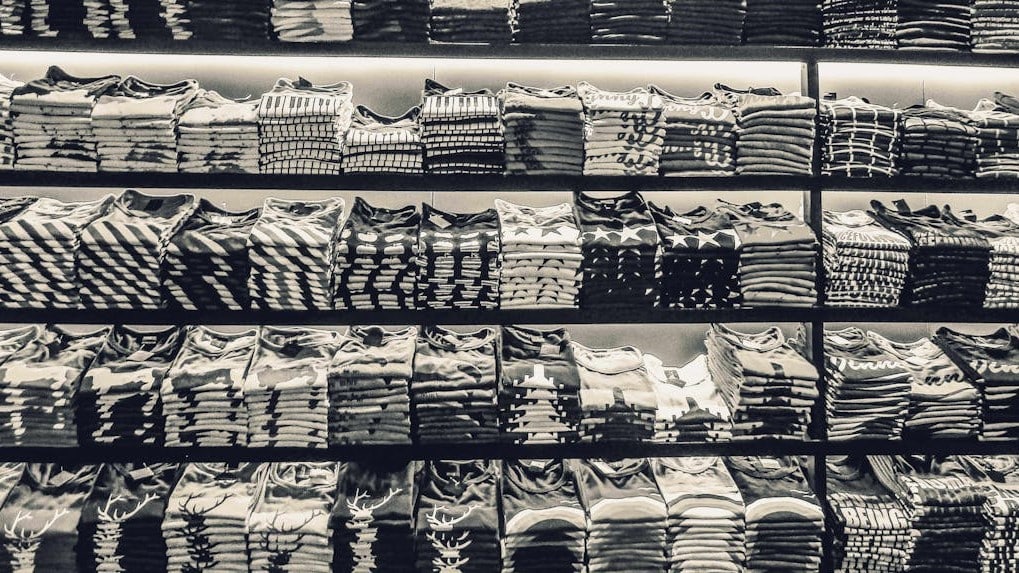
Best for Everyday Casual Wear
For casual clothes, comfort and airflow are important. Cotton jersey fabric is the best pick for daily outfits. It feels soft and stretches naturally, making it great for t-shirts and dresses. Unlike stiff woven cotton, cotton jersey stretches in all directions. This makes it comfy for snug-fitting clothes and a top choice for casual wear.
Most t-shirts fabric weigh about 140 - 230 GSM. This weight balances strength, comfort, and usefulness for daily wear. Clothes made from 100% cotton are often seen as the best for casual use. They are soft, breathable, and keep you cool all day. But, you need to wash them carefully to avoid shrinking or fading.
If you want comfy clothes for daily use, choose cotton jersey fabric. Its natural features make it a dependable and cozy option for casual outfits.

Best for Sports and Activewear
For sports, performance matters most. Synthetic jersey fabric is perfect because it wicks sweat away. It pulls moisture off your skin, helping it dry fast. This keeps your body cool and stops clothes from feeling wet during workouts. Whether you run, bike, or do yoga, these fabrics keep you dry and focused.
Breathable fabrics with air vents are great for hot weather. They stop overheating and keep you comfy during tough exercises. In cold weather, synthetic jerseys with thermal layers keep you warm while staying flexible. These fabrics are also strong, lasting through many washes and heavy use without losing shape.
If you need workout clothes, synthetic jersey fabric is the best pick. It handles sweat, movement, and temperature changes, making it ideal for active people.
Best for Sustainability and Eco-Friendliness
If you care about the planet, think about a fabric’s impact. Cotton jersey fabric, especially organic or recycled types, is eco-friendly. Organic cotton skips harmful chemicals and uses less water. Recycled cotton reuses old materials, cutting waste and helping the environment.
Synthetic fabrics come from oil-based materials and take a long time to break down. But recycled synthetics, like recycled polyester, reduce waste and use fewer new resources. Certifications like GOTS and GRS ensure these fabrics meet strict eco-friendly rules.
Index/Certification | Description |
|---|---|
Higg Materials Sustainability Index | Rates fabrics on their environmental effects from start to finish. |
Made-By Environmental Benchmark | Grades fibers on emissions and water use, from A to E. |
GOTS | Approves organic textiles for safe production and labeling. |
GRS | Verifies recycled materials meet eco-friendly and traceable standards. |
Tip: Check for labels like GOTS or GRS when buying eco-friendly fabrics. These ensure high environmental quality.
For green choices, organic cotton and recycled fabrics are the best. They offer great quality while being kind to the Earth, making them a smart pick for sustainability.
Other Things to Think About
When picking between cotton and synthetic jersey fabrics, consider more than comfort or cost. Other factors can affect how the fabric feels and works in real life.
How the Fabric is Made
The way fabric is made changes how it feels and works. Knit fabrics, like jersey, stretch naturally. But the fibers and how tightly they’re knitted can make a difference. A tight knit feels smoother but may not let air through. A loose knit allows more airflow, keeping you cooler.
Think about how smooth, soft, or warm the fabric feels. These qualities affect how comfy it is on your skin. The table below shows why these traits matter:
Sensory Attribute | Importance in Fabric Choice |
|---|---|
Smoothness | High |
Softness | High |
Warmth | Medium |
Thermal Comfort | High |
If you want softness and smoothness, cotton jersey fabric is a great pick. But for better warmth during workouts, synthetic jersey fabric is a good choice.
Feeling and Other Experiences
Wearing fabric isn’t just about touch. How it moves or reacts to temperature also matters. Even knowing a fabric is eco-friendly can make you feel good about wearing it.
Here’s a table showing what affects your experience:
Factor | Description |
|---|---|
Fabric Construction | Changes how comfy it feels |
Physical Stimuli | Impacts comfort during movement |
Non-physical Stimuli | Includes feeling good about eco-friendly choices |
If you care about the planet, organic or recycled fabrics are great. They mix function with eco-friendliness, giving you peace of mind.
Comfort Features
Comfort depends on things like warmth, airflow, and how well it absorbs sweat. For example, fabrics that let air through keep you cool. Fabrics with good thermal resistance keep you warm. The table below explains these features:
Comfort Property | Effect on Fabric Choice |
|---|---|
Thermal Resistance | High |
Liquid Water Resistance | Medium |
Air Permeability | High |
Absorbency | Medium |
Water Vapor Permeability | High |
For hot weather, pick fabrics with good airflow and sweat control. Synthetic jersey fabrics are great for sports because they excel in these areas.
Your Lifestyle and Choices
Your daily life and preferences should guide your pick. If you like natural materials and care about the planet, go for cotton jersey fabric. If you’re active and need performance clothes, synthetic jersey fabric is better. Always think about how the fabric fits your activities and values.
Tip: Choose fabric based on where and how you’ll use it. Whether relaxing at home or working out, the right fabric makes a big difference.
Deciding between cotton and synthetic jersey fabrics depends on what you need. Cotton jersey is soft, breathable, and eco-friendly, making it great for casual clothes and sustainability. Synthetic jersey is strong, wicks sweat, and stretches well, making it ideal for sports and activewear.
Here’s a simple comparison to guide your choice:
Feature | 100% Cotton | Synthetic (Lycra) |
|---|---|---|
More in single knits | Less in double knits | |
Spirality | More in single knits | Less in double knits |
Pilling Grade | Good | Good |
Tip: Want comfort and eco-friendliness? Pick cotton. Need durability and performance? Go with synthetic.
FAQ
What is the main difference between cotton and synthetic jersey fabrics?
Cotton jersey is soft and feels natural on skin. Synthetic jersey stretches more and lasts longer. Cotton is great for casual clothes because it’s comfy. Synthetic fabrics are better for sports since they dry sweat fast and move well.
Can you wash cotton and synthetic jersey fabrics the same way?
No, they need different care. Wash cotton jersey in cold water to stop shrinking. Synthetic jersey can be washed in warm water and dries quickly. Always read the care label for exact washing tips.
Which fabric is better for sensitive skin?
Cotton jersey is best for sensitive skin. It’s soft and gentle, causing no irritation. Synthetic fabrics might bother some people due to chemicals. Organic cotton is the safest choice for sensitive skin.
Are synthetic jersey fabrics eco-friendly?
Not always. Synthetic fabrics are made from oil-based materials and don’t break down easily. Recycled synthetics, like recycled polyester, are better for the planet. Look for eco-labels like GRS for greener options.
How do I choose the right jersey fabric for my needs?
Think about what you need. For comfort and casual wear, pick cotton jersey. For sports or workouts, synthetic jersey is the best choice. If you care about the environment, go for organic cotton or recycled fabrics. Match the fabric to your lifestyle and values.

